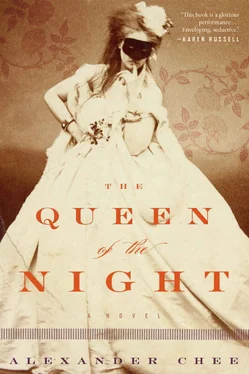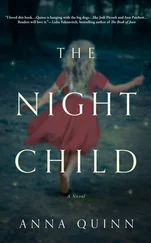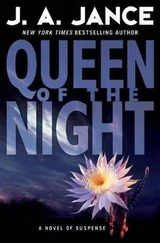I had imagined the scene in my head many times as I waited, trying to prepare if I was called, and I am certain this was her plan. Some days I imagined him enraged, some, come over with passion. Or both.
She meant even then, even as the Emperor would have me as revenge for the Empress’s affair, to take some revenge of her own. Known only to her.
But I would never know the earrings’ last secrets, the ones they cannot tell; I can only guess. What I know for certain is that Il Trovatore was a favorite opera of the Empress’s, and she and the Emperor would have attended together. Certainly, I was there to be seen, on display to the Emperor, or one of his intimates, or one of his agents, perhaps even the Empress. I went with her that night as the proof she had me in her custody. And for her to place these earrings in my ears, this was her declaration of war.
In those years when I believed the ruby rose lost to me forever, I would sometimes take the earrings out and reflect on what I thought was the irony of my situation: that after the loss of one tiny jeweled gift from the Emperor, I was now the custodian of this other, far greater gift he had given to the Comtesse.
Now it seemed I was fated to have both.
These were my thoughts on that evening, many years later, when I again went to the statue, opened the lock, and took these earrings out to wear them one more time.
§
I was dressed in a gown of black chiffon and taffeta; sheer sleeves and a black lace ruff at the neck were the gown’s only whimsy, and so the emeralds went well with this. They suited me finally. Back when I first wore them in the Café Anglais, I most likely looked like an overdressed girl who’d taken them from her mother, out trying to pass herself off as an elegant woman. I remember I sat there that night, too aware of the fortune in my ears, trying to look as if I deserved them, all the while I felt myself to be vanishing, falling further inside a story I couldn’t see, in which I occupied a role that was both central and yet also minor, and that required this of me to operate — and would not give me my freedom. This story seemed, perhaps, to have begun when I put on the earrings, or further back, when the earrings were given to the Comtesse, or even further back, when they were made. Or even further back still, when the idea of them was born in the mind of the giver. I couldn’t know. I only knew that something was in motion to which my actions had proven vital and that I was not to be allowed to see any further than this. Questions had repeated through me in a chorus that night. Why could the tenor not know of her arrangement with me? Who had set those terms, in turn, with her — who had the power to do so? Had he been in the lobby of the opera? Had we succeeded then? Whose story was I in?
Whose story was I in?
This was the question I had asked myself that night so long ago as the tenor led me to his carriage. This was also the question I asked myself now in my apartment each time I held Simonet’s novel in my hand. Once again, I had the distinct feeling of being inside of a story that had begun somewhere out of my sight. A story around me that would also not let me inside it. A story begun with someone imagining my holding the book as I did just then. There was something this person wanted me to believe as I did so — what was it? And why?
The return of this feeling, more than anything else, was what had made me suspicious.
Whose story was I in?
I had woken that morning from a long dream that had turned and tumbled until I could no longer remember any of it except a name that stayed with me as I was delivered up from the ocean of sleep.
Simmonet? Simonet.
And with that, a memory came of the writer George Sand. Sand had a nephew by that name or something like it.
Was my Simonet, the author of this novel, her nephew? Or even secretly George Sand?
I stepped from my bed, took the novel from my nightstand, and turned it over in my hands as if some previously hidden secret to its authorship would fall out, but there was, as ever, nothing except the words I’d refused thus far to read.
Sand was dead now these last six years — if she was the author, this was the work of her ghost. After being presented to her, I’d admired her so much that I hoped to inspire a character in one of her novels some day, much as Pauline Viardot-García, my voice teacher, had — Pauline had introduced me to Sand; she was her oldest friend. I tried to remember if, on that fortnight’s visit, I was ever presented to Sand’s nephew or if he’d any literary aspirations. But my Simonet had been so free in speaking of other French writers, it seemed to me that if he was Sand’s nephew, I would already have been told by him directly.
I set the novel down, full of the same dread I’d felt since being told of its existence and rang for my breakfast tray.
Not quite a week had passed since the bal and the mysterious novel’s arrival, and in attempting to certify whether its existence constituted a betrayal of some kind, I had gone through my short list of suspects — Euphrosyne, the tenor, the Comtesse — without luck. Euphrosyne seemed entirely innocent to me, even of carelessness, and seeing her glittering in her elegant home reminded me that my past was not a subject she spoke of to others, just as she did not speak of hers; she would protect me much as she protected herself. She had forgiven me instantly for my abrupt departure from her salon, and now each day’s mail brought me more letters from her of the bal she was planning for me.
My visit to the tenor had likewise reassured me that all between us was as it had been for some time. His long obsession with me seemed unchanged. I did not suspect him of being the source of the marriage rumor, either. He had once proposed marriage to me, and I had rejected him as, just as the Comtesse had said so plainly all those years ago, I was as unfit to marry him or any other men of his class as I ever had been; and this, like his social class, would never change. What he wanted from me did not require marriage nor did it derive from it. We both knew that when he saw me sing on that little stage at the Majeurs-Plaisirs he hadn’t imagined our sitting with a batch of baby tenors and sopranos, and my pulling at a spindle somewhere in Prussia. He imagined us together in Paris, on the stage, at last singing Il Trovatore at Les Italiens.
I had rejected him by reminding him of all of this in no uncertain terms. And by denying him, I had ensured he would be a servant to this dream forever and, in a way, to me — in a way that protected me. My visit had assured me all of this was as it had been since that rejection so long ago. It would thus be too painful for him to joke in public of something he still desired.
And there was every chance he had since married some Prussian princess picked out by his family at birth and left behind to be the mistress of that distinguished, ancient, if also somewhat reduced, domain — him all the while in Paris. In the times I had seen him since the end of our liaison, he had seemed richer than before, and I knew well that for men of his class a wife was what secured you your inheritance and her dowry, and a lover was where you spent both. But I did not know, and had never asked, if there was a wife. Either way, I no longer suspected him.
The Comtesse alone remained, albeit out of reach. I had never told her of the end to my liaison with the tenor. I was sure my value to her — and our bargain — had ended once Eugénie had been driven from the palace. The discovery that she was still surrounded by agents, and French agents at that, not Italian ones, a decade after the passing of the Empire, this had only made me fear she did not agree that our agreement had ended; this left me the more sure she was my mysterious antagonist. And while the police officer I’d spoken to that day seemed content to think he knew me for knowing my reputation as a singer, if he were to check into my background, he might find that series of mysteries that could lead him even a little of the way back to the Comtesse, who knew the answers to most every question he might ask — and I was certain she could still provide my old dossier on request. For all I knew, she had my old carte from the registry and the record of my examinations and arrests — and death.
Читать дальше












